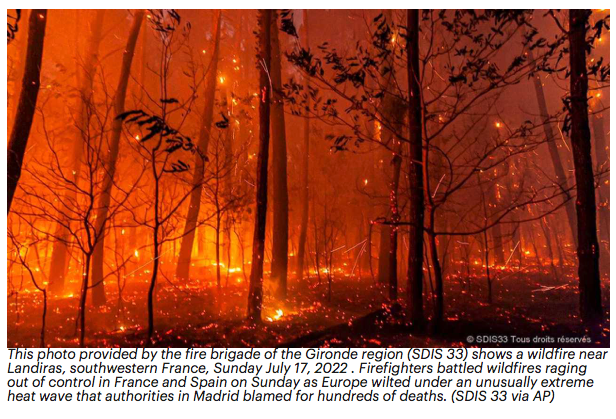BY MICHAEL E. MANN AND SUSAN JOY HASSOL, OPINION CONTRIBUTORS – 07/22/22 12:30 PM ET
>>THE VIEWS EXPRESSED BY CONTRIBUTORS ARE THEIR OWN AND NOT THE VIEW OF THE HILL<<
Winter seems but a distant memory as we suffer through the dog days of mid-summer. And yet Dickens’ “A Christmas Carol” proves salient for this moment. Much as Scrooge, through the foreboding ghost of Christmas future, was provided a glimpse of what horrors were to befall him if he didn’t mend his ways, we too have been provided with a premonition of what climate-change-wrought catastrophes threaten our future if we fail to curtail the burning of fossil fuels.
We might extend this metaphor further. Who is Scrooge in this scenario? Could it be the Democrat-in-name-only coal-state senator of West Virginia, Joe Manchin, who has single-handedly blocked the efforts of fellow Democrats to pass meaningful climate action? Perhaps. But Scrooge put too little coal on the fire, while Manchin wants to add too much (and to his own financial benefit) to our current planetary fire. And Scrooge was redeemable in the end. The jury is still out on Manchin.
Where the analogy works well, however, is that the onslaught of record heat waves, wildfires, floods and deadly glacial avalanches that have plagued us this summer are, as the most recent report of the Intergovernmental Panel on Climate Change (IPCC) has warned us, just a sign of much worse, deadlier, climate-change-driven weather events to come if we fail to rein in planetary warming.
Climate-change-denying politicians love to attack the IPCC as alarmist. It pleases the fossil fuel barons who fund them. But if anything, the IPCC has likely underestimated the role climate change is playing in the increase in persistent weather extremes we’ve seen in recent summers.
One of us has collaborated on research investigating how the asymmetric pattern of the warming of Earth’s surface (wherein the polar regions have warmed more than the middle latitudes) alters the behavior of the summer jet stream. Specifically, it favors a tendency for high-amplitude meanders of the jet stream that remain locked in place, leading to highly persistent deep high and low-pressure centers associated, alternately, with extreme heat, drought, wildfire or extreme flooding.
This jet stream “resonance” phenomenon was implicated in the oppressive “heat dome” experienced last summer in the Pacific Northwest. It was also associated with the extreme heat in the central/eastern U.S. and flooding in the West in mid-June. And it is associated with the dramatic and deadly heat wave and wildfires Europe has experienced over the last week, and similar heat extremes we are witnessing this week over a large part of the U.S.
Climate models don’t do a good job reproducing this particular phenomenon. The models may consequently be underestimating the role that climate change is playing with these more frequent, amplified extreme summer weather events. Uncertainty, once again, isn’t our friend. To the extent that some important processes have not been well-represented in models, whether it be ice sheet collapse and sea level rise, or the rise in extreme weather events, the models are likely underestimating some key climate change impacts.
Only a month ago, when 100 million Americans faced withering heat, we said it was time to ring the alarm bell yet again, louder and more urgently. This week, even more Americans are facing withering heat, and so we’re ringing that bell again, if possible, even more loudly and urgently.
At the very time that we are observing the truly devastating consequences of past inaction, we are also encountering obstacles to the necessary actions today. The radical right-wing majority on the Supreme Court has constrained the Environmental Protection Agency’s (EPA) efforts to limit carbon emissions from coal-fired powerplants, and Manchin, in his latest Lucy-and-the-football maneuver, has once again dampened any hopes of Democrats passing climate legislation in the current session of Congress.
It is easy, at such a moment, to become disillusioned but we mustn’t. If “A Christmas Carol” could end happily, why can’t this story? In both cases, salvation involves coming to terms with past mistakes. In “A Christmas Carol,” it involved the efforts of one individual — Scrooge. With today’s climate crisis, it involves all of us collectively.
If we are to see meaningful climate legislation pass Congress, it will require massive turnout in the midterm elections by voters who value and prioritize a livable climate. With a Congress that is willing to pass a major climate bill that incentivizes renewable energy and disincentivizes fossil fuel infrastructure and extraction, the U.S. would be in position to meet its obligations to the rest of the world to cut its carbon emissions in half by 2030.
It all starts with us, and the upcoming midterm elections. If Tiny Tim can survive, so can global climate action.
Michael E. Mann is distinguished professor of atmospheric science at Pennsylvania State University. He is author of “The New Climate War: The Fight to Take Back Our Planet.” Follow him on Twitter: @MichaelEMann
Susan Joy Hassol is director of the non-profit Climate Communication. She publishes Quick Facts on the links between climate change and extreme weather events. Follow her on Twitter: @ClimateComms
To read the article in The Hill click here.

